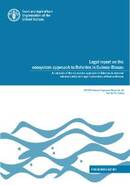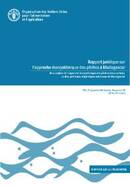EAF-Nansen Programme reports

Legislating for the ecosystem approach to fisheries (EAF) is complex, due to the holistic nature of the EAF involving multiple factors that underpin the social, economic, environmental, and institutional aspects of fisheries sustainability. These factors include ecosystems integration, risks, inter-sectoral collaboration, research, participatory processes, monitoring, control, surveillance, and enforcement, among others. To assess how the EAF is being implemented through national policy and legal frameworks, FAO developed A diagnostic tool for implementing an ecosystem approach to fisheries through national policy and legal frameworks.
The present legal report on the EAF used the diagnostic tool to assess the alignment of selected policy and legal instruments of Guinea-Bissau with the EAF. This assessment analysed the extent to which 82 EAF legal requirements, which are considered the minimum standards in legislating for the EAF, are reflected in Guinea-Bissau's policies and legislation relevant to the fisheries sector of the country and other relevant sectors (such as environment, wildlife, ecosystems, and maritime affairs). Based on this preliminary diagnosis, gaps were identified in the assessed instruments, and recommendations were made for improving the implementation of the EAF
This report was elaborated following a participatory approach with the involvement of the national competent authorities of Guinea-Bissau. Drafted in July 2021, the report was submitted to the national authorities of Guinea-Bissau in October 2021. The Ministry of Fisheries, through its Secretary-General and Legal Office, endorsed this EAF Legal Report of Guinea-Bissau in July 2022.

The present legal report on the EAF used the diagnostic tool to assess the alignment of selected policy and legal instruments of Angola with the EAF. This assessment analysed the extent to which 82 EAF legal requirements are reflected in Angola' policies and legislation relevant to the country’s fisheries sector and other sectors that interact with fisheries (such as environment, wildlife and ecosystems, maritime). Based on this preliminary diagnosis, gaps were identified in the assessed instruments, and recommendations on specific areas that need further improvement.
Legislating for an ecosystem approach to fisheries (EAF) is complex, due to the holistic nature of EAF involving multiple factors that underpin the social, economic, environmental, and institutional aspects of fisheries sustainability. These factors include ecosystems integration, risks, inter-sectoral collaboration, research, participatory processes, monitoring, control, surveillance, and enforcement, among others. To assess how the EAF is being implemented through national policy and legal frameworks, FAO developed A diagnostic tool for implementing an ecosystem approach to fisheries through national policy and legal frameworks.
This report was elaborated following a participatory approach with the involvement of the national competent authorities of Angola. Drafted in July 2021, the report was submitted to the national authorities of Angola in October 2021. The Ministry of Agriculture and Fisheries of Angola endorsed this EAF Legal Report of Angola in June 2022.

Légiférer en conformité avec l'approche écosystémique des pêches (AEP) est une tâche complexe, compte tenu de la nature holistique de l'AEP, qui implique une multitude de facteurs étayés par les aspects sociaux, économiques, environnementaux et institutionnels ayant un impact sur la durabilité de la pêche. Pour évaluer la manière dont l’AEP est appliquée dans les cadres politiques et juridiques nationaux, la FAO a développé un outil de diagnostic pour la mise en œuvre d'une approche écosystémique des pêches à partir des cadres politiques et juridiques.
Le présent rapport juridique sur l'AEP a eu recours à cet outil de diagnostic pour évaluer la conformité de certains instruments politiques et juridiques de Madagascar avec l'AEP. Cette évaluation a analysé dans quelle mesure les 82 exigences juridiques de l'AEP, jugées comme les normes minimales pour légiférer selon l'AEP, sont prises en compte dans les cadres politiques et juridiques malgaches relatifs au secteur de la pêche du pays et à d'autres secteurs pertinents (comme l'environnement, la faune, les écosystèmes et les affaires maritimes). À partir de ce diagnostic préliminaire, des lacunes ont été identifiées dans les instruments évalués et des recommandations ont été formulées en vue d'améliorer la mise en œuvre de l'AEP.
Ce rapport a été établi suivant une approche participative impliquant les autorités nationales malgaches compétentes. Rédigé en juillet 2021, le rapport a été soumis aux autorités nationales de Madagascar en octobre 2021. Le Ministère de la pêche et de l’économie bleue a avalisé ce rapport juridique sur l’AEP à Madagascar en mai 2022.

Legislating for the ecosystem approach to fisheries (EAF) is complex, due to the holistic nature of the EAF involving multiple factors that underpin the social, economic, environmental, and institutional aspects of fisheries sustainability. These factors include ecosystems integration, risks, inter-sectoral collaboration, research, participatory processes, monitoring, control, surveillance, and enforcement, among others. To assess how the EAF is being implemented through national policy and legal frameworks, FAO developed A diagnostic tool for implementing an ecosystem approach to fisheries through national policy and legal frameworks.
The present legal report on the EAF used the diagnostic tool to assess the alignment of selected policy and legal instruments of Kenya with the EAF. This assessment analysed the extent to which 82 EAF legal requirements, which are considered the minimum standards in legislating for the EAF, are reflected in Kenya's policies and legislation relevant to the fisheries sector of the country and other relevant sectors (such as environment, wildlife, ecosystems, and maritime affairs). Based on this preliminary diagnosis, gaps were identified in the assessed instruments, and recommendations were made for improving the implementation of the EAF.
This report was elaborated following a participatory approach with the involvement of the national competent authorities of Kenya. Drafted in July 2021, the report was submitted to the national authorities of Kenya in November 2021. The Ministry of Agriculture, Livestock, Fisheries and Cooperatives, Kenya, endorsed this EAF Legal Report in June 2022.

Legislating for the ecosystem approach to fisheries (EAF) is complex, due to the holistic nature of the EAF involving multiple factors that underpin the social, economic, environmental, and institutional aspects of fisheries sustainability. These factors include ecosystems integration, risks, intersectoral collaboration, research, participatory processes, monitoring, control, surveillance, and enforcement, among others. To assess how the EAF is being implemented through national policy and legal frameworks, FAO developed A diagnostic tool for implementing an ecosystem approach to fisheries through national policy and legal frameworks.
The present legal report on the EAF used the diagnostic tool to assess the alignment of selected policy and legal instruments of Gambia with the EAF. This assessment analysed the extent to which 82 EAF legal requirements, which are considered the minimum standards in legislating for the EAF, are reflected in Gambia's policies and legislation relevant to the fisheries sector of the country and other relevant sectors (such as environment, wildlife, ecosystems, and maritime affairs). Based on this preliminary diagnosis, gaps were identified in the assessed instruments, and recommendations were made for improving the implementation of the EAF.
This report was elaborated following a participatory approach with the involvement of the national competent authorities of Gambia. Drafted in July 2021, the report was submitted to the national authorities of Gambia in November 2021. The Gambia Fisheries Department endorsed this EAF Legal Report of Gambia in April 2022.
